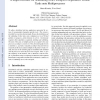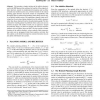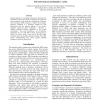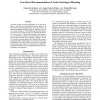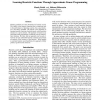102
Voted
AAAI
2004
15 years 4 months ago
2004
We present a general framework for studying heuristics for planning in the belief space. Earlier work has focused on giving implementations of heuristics that work well on benchma...
117
Voted
ISCAPDCS
2007
15 years 4 months ago
2007
We address distributed real-time applications represented by systems of non-preemptive dependent periodic tasks. This system is described by an acyclic directed graph. Because the...
113
click to vote
IJCAI
2007
15 years 4 months ago
2007
Many current state-of-the-art planners rely on forward heuristic search. The success of such search typically depends on heuristic distance-to-the-goal estimates derived from the ...
129
Voted
ALENEX
2008
15 years 4 months ago
2008
Consensus clustering is the problem of reconciling clustering information about the same data set coming from different sources or from different runs of the same algorithm. Cast ...
121
Voted
AAAI
2010
15 years 4 months ago
2010
g Without a Heuristic: Efficient Use of Abstraction Bradford Larsen, Ethan Burns, Wheeler Ruml Department of Computer Science University of New Hampshire Durham, NH 03824 USA blars...
113
click to vote
ECAI
2008
Springer
15 years 4 months ago
2008
Springer
We introduce a simple variation of the additive heuristic used in the HSP planner that combines the benefits of the original additive heuristic, namely its mathematical formulation...
120
Voted
CSCLP
2005
Springer
15 years 4 months ago
2005
Springer
“Heuristic synergy” refers to improvements in search performance when the decisions made by two or more heuristics are combined. This paper considers combinations based on prod...
141
Voted
FLAIRS
2007
15 years 5 months ago
2007
Though attention to evaluating human-robot interfaces has increased in recent years, there are relatively few reports of using evaluation tools during the development of humanrobo...
116
Voted
FLAIRS
2007
15 years 5 months ago
2007
Currently, among the fastest approaches to AI task planning we find many forward-chaining heuristic planners, as FF. Most of their good performance comes from the use of domain-i...
103
Voted
AIPS
2008
15 years 5 months ago
2008
Planning problems are often formulated as heuristic search. The choice of the heuristic function plays a significant role in the performance of planning systems, but a good heuris...

